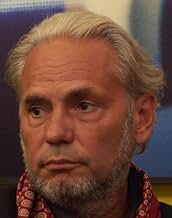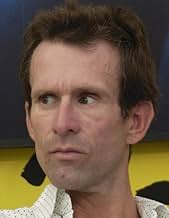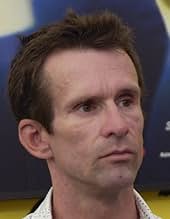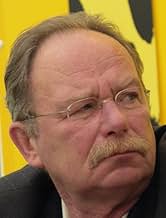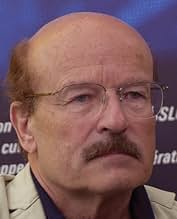AVALIAÇÃO DA IMDb
7,0/10
2 mil
SUA AVALIAÇÃO
Adicionar um enredo no seu idiomaA drama loosely based on Jean Bernard's Nazi-era prison diary.A drama loosely based on Jean Bernard's Nazi-era prison diary.A drama loosely based on Jean Bernard's Nazi-era prison diary.
- Direção
- Roteiristas
- Artistas
- Prêmios
- 6 vitórias e 13 indicações no total
Vladimír Fiser
- Bischof Kozal
- (as Vladimir Fiser)
Peter Varga
- Józef (Polish Inmate)
- (as Petr Varga)
- Direção
- Roteiristas
- Elenco e equipe completos
- Produção, bilheteria e muito mais no IMDbPro
Avaliações em destaque
"The Ninth Day" is one of Volker Schlondorff's finest directorial feats. It covers an episode of the Nazi concentration Camp of Dachau in which there was a lesser known group of Catholic priests who were incarcerated and half of them exterminated by the oppressive regime that had enveloped Germany in the 30's and 40's during WW II. It particularly revolves around a priest from Luxemburg, Father Henri Kremer, who is released for a nine day period from the camp in order to develop positive relationships between the Bishop of Luxemburg and the Pope and Adolph Hitler's Nazi goals of extermination of specific groups of peoples. Ulrich Matthes plays Henri Kremer and he is very convincing in his strength of faith and love of family in his struggle to accomplish what he has been requested by the Gestapo to do. August Diehl is brilliant in his portrayal of Unterstumfuhrer Gebhardt, the demanding and ruthless Gestapo leader who degrades and tortures his victims to the nth degree. The cruel treatment and crucifixions of the priests is difficult to watch, yet this is a true recollection of events documented by the writer of the book by the same name. He was one of the few Catholic priest survivors of the camp. This film was released in 2004, and it is now on DVD and well worth the viewing for an historical standpoint with a different twist.
In World War II, after a period living hell on earth in the concentration camp of Dachau with other catholic priests, Father Abbé Henri Kremer (Ulrich Matthes) gets a nine days leave to return to his home town for his mother's funeral. Along this period, the SS Gestapo lieutenant Gebhardt (August Diehl) tries to persuade Henri, who was born in silver-spoon and member of an influent Luxembourgian family, to convince the local bishop to give-up resisting to the Germans and write a letter to the Vatican in the name of the Catholic Church of Luxemburg convincing the Pope to support Hitler and the Nazi regime. The ambivalent Henri questions himself and the bishop what he shall do.
Based on a true story, "Der Neunte Tag" is an awesome movie and another impressive example of the powerful German cinema, of which I am a great fan. The philosophical duel between the characters of Ulrich Matthes and August Diehl is simply fantastic, with magnificent silence and dialogs. Sometimes, silence associated to the expression of the face is more significant than words. The direction is stunning and very realistic, particularly in the concentration camp; the music score and the cinematography are very beautiful; and the performances are perfect, with the two lead actors deserving nominations to the Oscar. My vote is nine.
Title (Brazil): "9o Dia" ("9th Day")
Based on a true story, "Der Neunte Tag" is an awesome movie and another impressive example of the powerful German cinema, of which I am a great fan. The philosophical duel between the characters of Ulrich Matthes and August Diehl is simply fantastic, with magnificent silence and dialogs. Sometimes, silence associated to the expression of the face is more significant than words. The direction is stunning and very realistic, particularly in the concentration camp; the music score and the cinematography are very beautiful; and the performances are perfect, with the two lead actors deserving nominations to the Oscar. My vote is nine.
Title (Brazil): "9o Dia" ("9th Day")
I do not at all understand how someone can dismiss this film as a "Catholic propaganda movie". That's utter rubbish. I was raised catholic and have converted to paganism but this was still an excellent movie. It does not try to push the catholic faith onto anyone. What it is about is, simply, one man's principles. In an awful time, in the face of torture and abuse, when he is being confronted with the most persuasive arguments and when no one could blame him for taking the easy way out and saving himself, can he stand by what he believes? Will he save himself and then live the rest of his life hating himself for it? This movie was completely engrossing from beginning to end. It absolutely gripped my emotions and my mind and held me riveted. It also left me thinking about it and haunted by it long afterward. I cannot recommend this movie highly enough. Brilliant. I found myself both attracted to and repelled by the character of the Nazi sent to persuade him. Amazing subject matter beautifully executed.
7nmuk
This movie has been unduly panned by IMDb critics as being Catholic propaganda, when there is hardly any. It's actually an exploration of questions on faith and morality, viewed from the perspective of Rev. Henri Kremer, a priest who has been "on leave" from Dachau to convince the Bishop of Luxemburg to support Nazism, who has been a silent opponent all throughout. At one point the film even mentions that the Pope however congratulated Hitler on his birthday - that clearly indicates the acquiescence of the Catholic world - to me that's quite the opposite of propaganda.
**** SOME SPOILERS AHEAD **** The movie chronicles each of the 9 days that Rev. Kremer is allowed, and his conversations with Gestapo officer Gebhardt. When Kremer fails to convince the Bishop, he is persuaded to write a memo himself, given his own respectability due to his family status. In return he can have all the priests in Dachau released. Kremer at one point thinks he is being like Judas betraying the Christian cause (also to be noted that his personal cash upon release amounted to 30 marks), which Gebhardt, a former theology student himself, argues is a necessary evil, because without Judas there would be no martyrdom of Christ, and hence no Christianity. Rev. Kremer also learns that by giving Nazi policies the official blessing of Catholicism, he can be responsible for the deportation of thousands - although some 40 priests could be let go from Dachau. The resulting dilemma of Kremer dominates the movie.
Ulrich Matthes is very convincing in the role of Kremer with his sunken cheeks and eyes, and watch the young actor August Diehl in the role of Untersturmfuehrer Gebhardt.
**** SOME SPOILERS AHEAD **** The movie chronicles each of the 9 days that Rev. Kremer is allowed, and his conversations with Gestapo officer Gebhardt. When Kremer fails to convince the Bishop, he is persuaded to write a memo himself, given his own respectability due to his family status. In return he can have all the priests in Dachau released. Kremer at one point thinks he is being like Judas betraying the Christian cause (also to be noted that his personal cash upon release amounted to 30 marks), which Gebhardt, a former theology student himself, argues is a necessary evil, because without Judas there would be no martyrdom of Christ, and hence no Christianity. Rev. Kremer also learns that by giving Nazi policies the official blessing of Catholicism, he can be responsible for the deportation of thousands - although some 40 priests could be let go from Dachau. The resulting dilemma of Kremer dominates the movie.
Ulrich Matthes is very convincing in the role of Kremer with his sunken cheeks and eyes, and watch the young actor August Diehl in the role of Untersturmfuehrer Gebhardt.
The Ninth Day is based on the true story of a Luxembourger priest (Henri) who is sent to Dachau concentration camp (among thousands of other priests in WW II) for standing against the Nazi regime. The film brilliantly contrasts the hell of the concentration camp with making a deal with the devil (i.e. the Nazi regime that sent him there) once Henri is "freed" to return home. Some very weak-minded individuals will call this film "propaganda", since it accurately portrays the persecution of the Catholic church (both the clergy and the laity) under the Nazi regime rather than the historical revisionism which was popularized by the communist bloc over the last few decades. Not for the faint of heart (there is very graphic brutality throughout), it is definitely worth watching as both a time-capsule of life during occupied countries during the Nazi regime as well as a wake-up call to future generations.
Você sabia?
- Erros de gravaçãoWhile their fellow-prisoner is being crucified, the priests are singing the hymn "Pange, lingua, gloriosi" by Thomas Aquinas (1264). However, they are singing a German version of this song, which was not in use before 1969. In addition, even if they happened to know a German version, it would be more likely for them to sing the original Latin version, as there were priests from all over Europe imprisoned in this block.
- ConexõesReferenced in Sim Senhor (2008)
- Trilhas sonorasConcerto Grosso No. 1
Music by Alfred Schnittke
Principais escolhas
Faça login para avaliar e ver a lista de recomendações personalizadas
- How long is The Ninth Day?Fornecido pela Alexa
Detalhes
- Data de lançamento
- Países de origem
- Central de atendimento oficial
- Idiomas
- Também conhecido como
- The Ninth Day
- Locações de filme
- Empresas de produção
- Consulte mais créditos da empresa na IMDbPro
Bilheteria
- Faturamento bruto nos EUA e Canadá
- US$ 72.888
- Fim de semana de estreia nos EUA e Canadá
- US$ 8.786
- 29 de mai. de 2005
- Faturamento bruto mundial
- US$ 135.311
- Tempo de duração1 hora 38 minutos
- Mixagem de som
- Proporção
- 1.85 : 1
Contribua para esta página
Sugerir uma alteração ou adicionar conteúdo ausente





